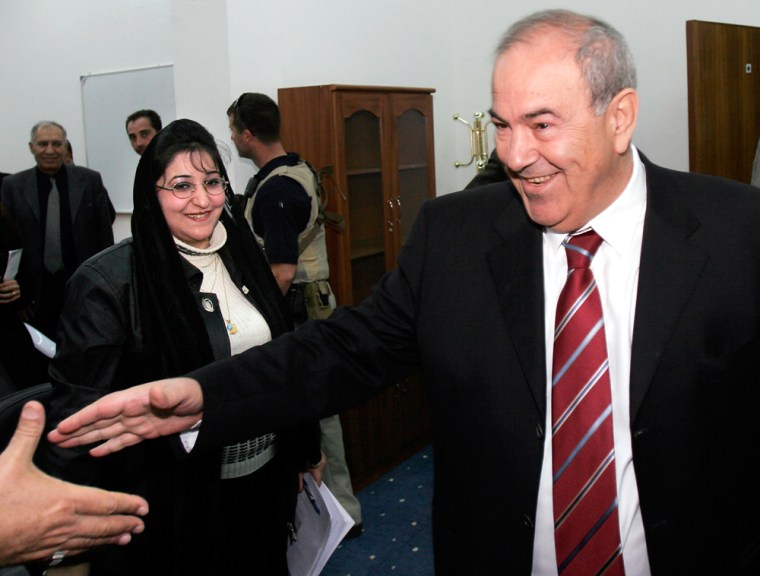Interim Prime Minister Ayad Allawi announced Wednesday he's forming a broad coalition to fight for the post of prime minister after Iraq's dominant Shiite political party nominated a conservative for the job.
Allawi would not provide details of the proposed coalition, but promised it would seek to establish a government "which believes in Iraq and its principles."
"There are other lists and other brothers in smaller lists which won the elections, and we are working with some of those lists to form a national Iraqi democratic coalition which believes in Iraq and its principles," Allawi told a news conference.
Flanked by two interim ministers who are members of his secular party, The Iraqi List, Allawi said "we will announce later on more details."
Kurdish parties weighed in with their own demands for top jobs including the largely ceremonial post of president.
Allawi, a secular Shiite, skirted criticism of Ibrahim al-Jaafari, nominated Tuesday by Iraq's dominant Shiite political party — the United Iraqi Alliance — as its candidate for prime minister. The decision made al-Jaafari the overwhelming favorite for the post.
But for al-Jaafari to take the premiership, he must build a coalition to gain agreement from Kurds and others on candidates for Cabinet posts before seeking the support of a majority of the National Assembly elected Jan. 30.
Al-Jaafari is one of the interim government's two vice presidents and head of Dawa, a conservative Islamic religious party. He fought Saddam Hussein and took refuge in Iran for a decade in the 1980's, when Iran was being transformed into a theocracy by Shiite clergy.
Allawi opposes Islamic governance, de-Baathification
Allawi said he considered al-Jaafari an "honorable man," but when asked if he feared that the alliance could impose Islamic rule in Iraq, Allawi said without elaboration that he opposed the creation of any form of Islamic government.
"We are liberal powers and we believe in a liberal Iraq and not an Iraq governed by political Islamists. But as a person he is an honorable man, fighter and a good brother," Allawi said.
Allawi also asked Iraq's Sunni minority, which mostly boycotted the elections, to come forward and play a role in the country's new government. Such a move could help deflate the insurgency, mostly thought to be made up of Sunni Arabs that once belonged to Saddam Hussein's Baath party.
"The missions ahead of us are very big, above all is achieving national unity by action and not only by saying, and the integration of the Iraqi sectors which didn't participate in the elections," Allawi said.
Allawi has staunchly opposed de-Baathification -- the effort to rid the government and administration of former Baath party members.
Interim National Security adviser Qassem Dawoud, a member of Allawi's party, said in naming the National Democratic Coalition that it would seek to include all Iraqis.
"I would like to announce on this blessed day the formation of a National Democratic Coalition to lead the democratic process which all Iraqis are looking for," Dawoud said. "This coalition represents the democratic coalition which will work ... to create a united Iraq, where all human values are flourish."
